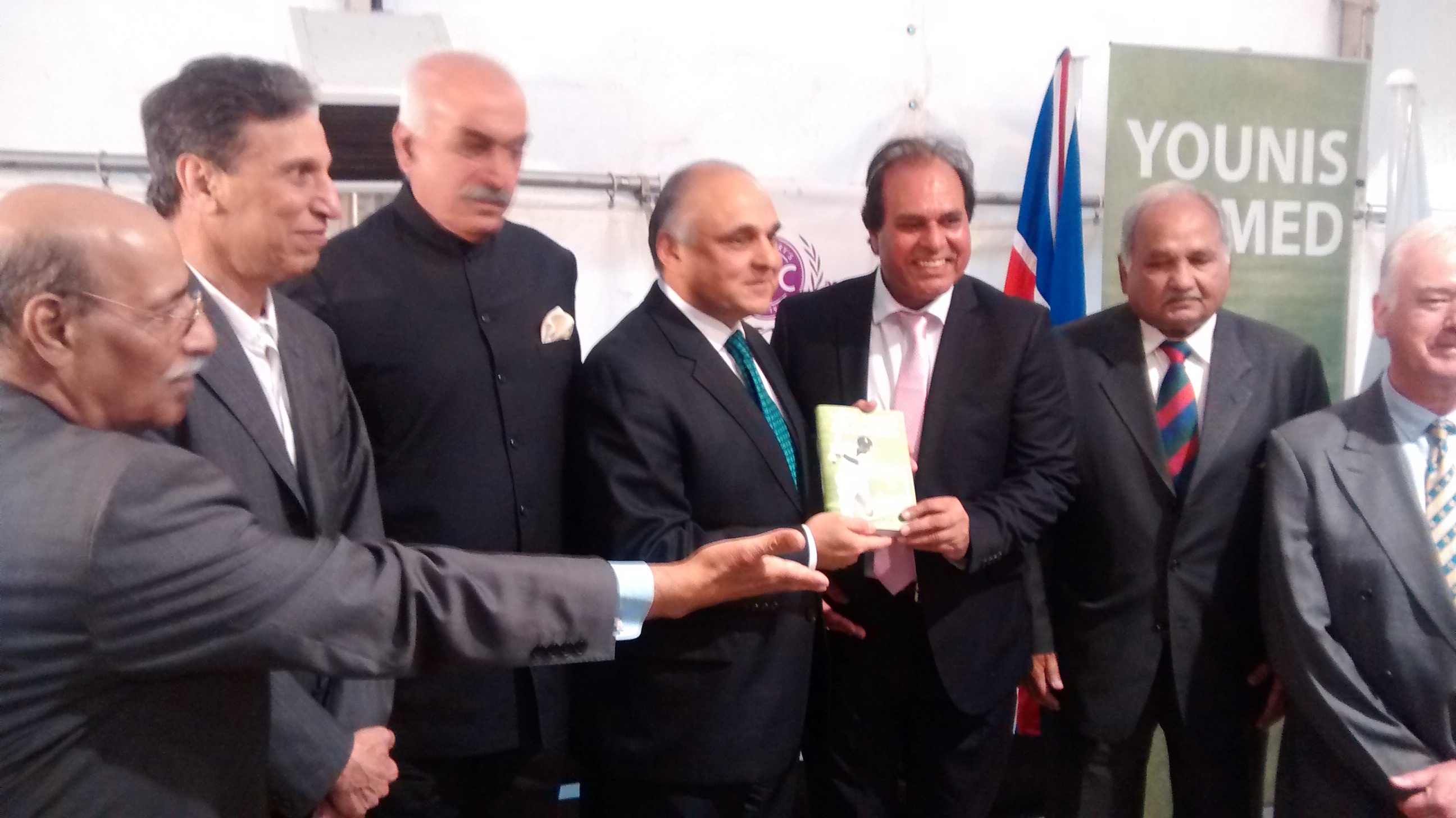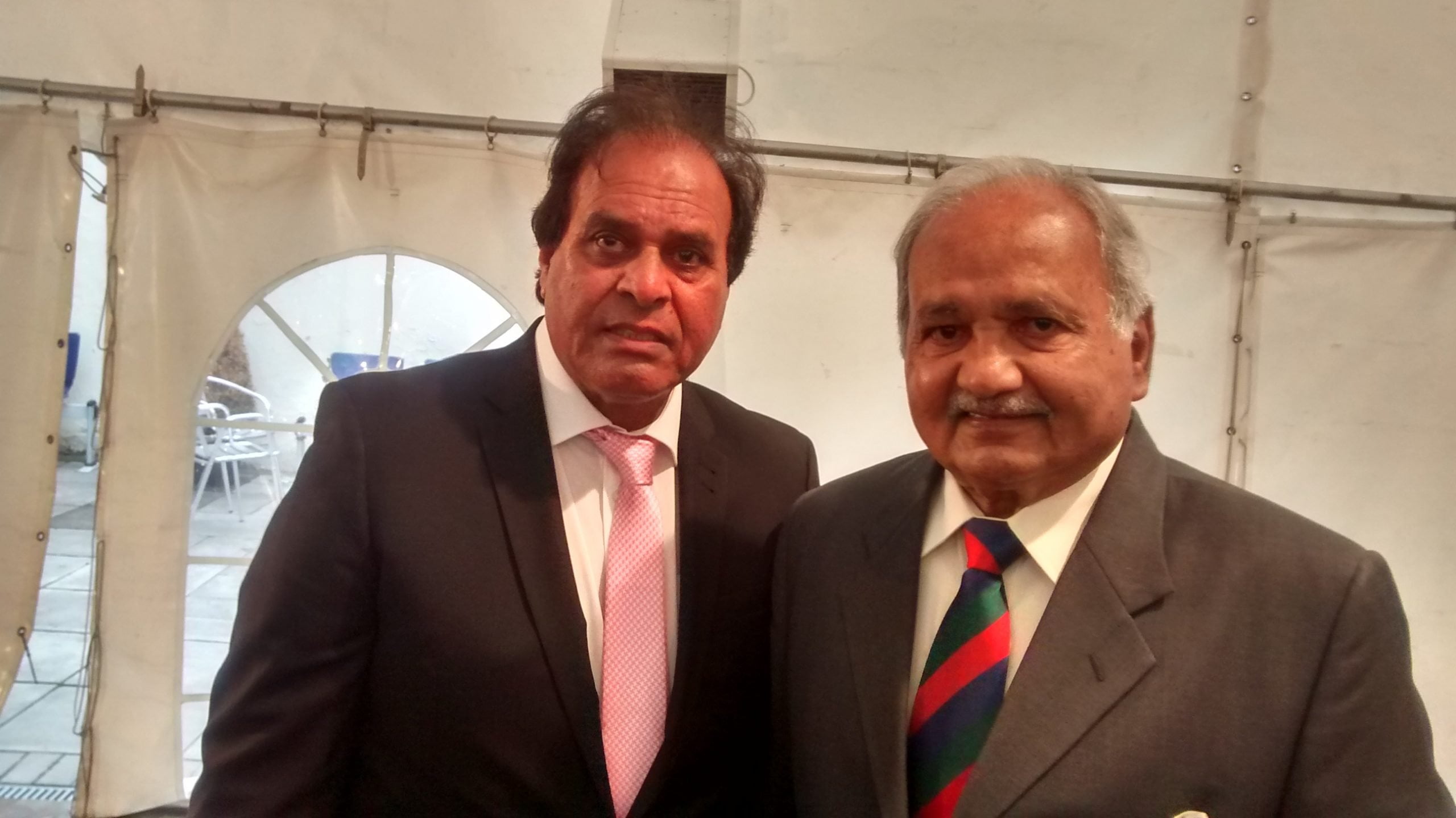Book Review
Younis Ahmed
The Forgotten Star of Pakistan Cricket
By Dr. Khadim Hussain Baloch &
Salim Parvez are (England-based freelance cricket writers)
For someone who was ‘disowned’ by his own countrymen and handed a life-ban in the prime of his career, Younis Ahmed did a ‘Muhammad Ali’ in standing his ground and refusing to bow down to what he refers to as ‘the autocratic ways of the BCCP’. Every inch a tenacious fighter, he carved out a 25-year first-class cricket career by defying odds in Pakistan, England, Australia and South Africa. Just when the rest of the world felt at ease by consigning him to the cricket archives, Younis braved the English winter – his first since the early 1970s – and in collaboration with Keith Booth, an official scorer of Surrey CCC since 1995, produced ‘Lahore to London’- an autobiography to match the best amongst Pakistan cricketers.
On his official book launch, which he referred to as ‘magnificent occasion’, in London on 31st May, amidst contemporaries, Mushtaq Mohammed, Asif Iqbal Asif Masood and Nasrullah Bhatti (from his Chburjee days) and the media spotlight, Younis looked at ease with himself, all the more in the presence and support of his wife, Puchi. In fact as nimble and sure footed as in his heydays. Syed Ibn-e-Abbas, Pakistan High Commissioner in the United Kingdom graced the occasion as the Chief Guest. Also present was Tim Lamb, former Chief Executive of ECB in the period 1996-2004.
For a cricketer who had been literally renounced, harshly treated and had his international cricket ruined, Younis showed very little bitterness and instead chose to lift the atmosphere with his humorous anecdotes. Few months short of his 69th birthday, Younis did himself proud on the night under the marquee that took a hammering of heavy rain and thunder. Nothing could steal the show from Younis, the star of the evening. The latest chapter of his often ‘turbulent and controversial’ journey, is all set to put the record straight and enhance his standing in cricket world. His claim to have, ‘no regrets whatsoever’ spoke volume of his conviction.
Arriving in England in 1965, only 17, Mohammed Younis (changing to Younis Ahmed in 1968) reported to The Oval and in no time was acknowledged as more than a bread-and-butter talent. He made it into a Surrey dressing room, no mean feat for it was a territory of household names, Ken Barrington, John Edrich and captain Micky Stewart. Younis, both handsome and sparkling in his stroke play, was one of the new batting stars on the horizon.
We learn from his memoirs that so often destiny would bring him at crossroads. At 21, after a splendid season of 1969 when he scored 1760 runs @47.56 for Surrey, it was a choice of staying in England or returning to his home country, Pakistan. His decision to return to Pakistan was partly family persuasion for his elder brother Saeed Ahmed was captain of the national side. The turbulent nature of Pakistan cricket was such that Saeed was replaced with Younis’ Surrey colleague Intikhab Alam, weeks prior to the 3-Test home series against New Zealand.
In fairness to the selectors they did welcome Younis into the Test squad despite his brothers’ dethroning. With scores of 8, 62, 0 and 19, he could not believe his ill luck when literally kicked out of the 3rd Test squad for Dacca and asked to stay in Lahore. Despite an encouraging start, Younis, some believed was treated unfairly for simply being Saeed Ahmed’s brother. A shattering blow to his future prospects for by accepting the invitation of BCCP, he had blown away his chances of being considered for the 1970-71 tour of England in Australia.
The National Selection Committee, headed Abdul Hafeez Kardar, could be credited with knee-jerk reaction and non-cricketing logic, all the more so after a surprise and embarrassing defeat in the 2nd Test at Lahore. The lowest-ranking side in the world New Zealand created history by winning its first-ever Test series in 40 years. Pakistan cricket hierarchy inexplicably, having shown the door, to no less than five of the most accomplished batsmen: Hanif Mohammed, Saeed Ahmed, Zaheer Abbas, Mushtaq Mohammed and Younis Ahmed.
Three years on another dilemma faced Younis when he was invited back to Pakistan to The National Camp in preparation for the 1972-73 tour of Sri Lanka, Australia and New Zealand. Once bitten, twice shy, Younis instead opted to honour is winter contract with South Australia in the Sheffield Shield. On Australian leg of leg of the tour, BCCP, without guidelines, came heavy-handed on elder brother Saeed Ahmed and Younis’ close friend Mohammed Ilyas, which allowed the three batsmen to drift away from the game. A huge loss for Pakistan, through mismanagement of its top officials, in a highly irresponsible way, all the more on an overseas tour.
Following a brilliant run in the 1973 English season, when he accumulated 1620 runs @52.25, Younis made a choice of accepting an invitation to join the 1973-74 D.H.Robin’s XI tour to South Africa. Not a straight forward choice for South Africa Government’s apartheid stance, more so due to The Basil D’Oliveira Affair – had polarized itself in the sporting world and its cricketers would not participate at international level for 21 years, i.e. 1970-91.

As one of the two ‘coloured’ players in the squad, besides West Indian all-rounder John Shepherd, Younis was convinced that his presence would be a step forward in keeping politics and sports apart and eventually leading to breaking the chains of apartheid. He was proven right as the rainbow nation in the post Nelson Mandela period, can boast of a number of world-class non-white players, Makhaya Ntini and Hashim Amla, to name a few.
The glut of first-class runs – 1539 @ 69.95 – produced by Younis Ahmed, in his first season with Worcestershire in 1979, brought him back to the spotlight. General Zia-ul-Haq, President of Pakistan, who himself hailed from Jullundur, ordered BCCP to lift Younis’ life ban. The lifting of a ban was significant for now he could play for either Pakistan or England. Had Younis accepted to play for Pakistan he would no longer be eligible for England and classed as an overseas in the county cricket. Though he was eligible and scoring heavily for Worcestershire and later with Glamorgan, he was not considered for selection for England, thus finishing off his international ambitions.
On his return to Pakistan domestic cricket, following a lapse of 17 years, in 1986-87, Younis named captain of Lahore City Cricket Association (LCCA) in the Quaid-i-Azam Trophy, hit 110 (293) in his first outing and retained good form, to earn a surprise and unexpected call from the cricket Board. He was summoned as a reinforcement, primarily on the insistence of Javed Miandad, vice captain to Imran Khan, on Pakistan’s tour of India. In the most bizarre twist of events, having returned to the national side after a world-record gap of 104 Test matches, Younis looked the part. On his ODI debut in front of full house at Eden Garden, Kolkata, showing good judgement both on front and back foot, he hit 58 (82 balls, 5 fours) in an opening stand of 106 with Ramiz Raja (58). His wristy trademark strokes, so badly missed by his country, admired all around. The stand, an ideal platform, saw Pakistan go on to snatch a thrilling win, with three balls to spare. Sadly despite showing good form, he was not considered for the 1987 England tour.
Of the three players, Khalid Ibadullah, Duncan Sharpe and Younis Ahmed, who did not enjoy lengthy international career, it was the last-named that perhaps was the biggest loss to Pakistan cricket. Younis, in an ideal world, would have provided a healthy competition to both Sadiq Mohammed and Wasim Raja, two frontline left-hand batsmen in Pakistan of the 1970s. As one of the most prolific run-getter of his time, Younis’ aggregate of 26,073 first-class runs is bettered only by Zaheer Abbas (34,843), Mushtaq Mohammed (31,091), Javed Miandad (28,647) and Majid Khan (27,444), amongst Pakistanis.
At this point as authors, we feel obliged to acknowledge an error (clarified on page 6 of Lahore to London) in Younis Ahmed’s profile in Encyclopaedia of Pakistan Cricket (2005). We extend our unreserved apology in stating him as half-brother of Saeed Ahmed. It was unfortunate that no attempt was forthcoming in clarifying the ‘perception’ of his being half-brother, ever since it appeared for the first time back in 1975. We can assure Younis Ahmed that no malice was intended on our part and that we are mindful of that fact that it may have caused hurt or indeed embarrassment to the family.
‘Lahore to London’ is a free-flowing story of a journey of a cricketer, who after the doors of international cricket was slammed in his face, did everything in his power to retain his dignity. Younis exercised his right as a professional sportsman to earn a crust for his family. The world of cricket was eagerly waiting to hear Younis’ side of the story, full of highs and lows, including brushes with the authorities. The author has been successful in toning it down for it not to be labelled as hard-hitting controversial publication.
‘Lahore to London’ -228-page hardback priced at £20 by Chequered Flag Publishing – a must read for the followers of Pakistan cricket.
